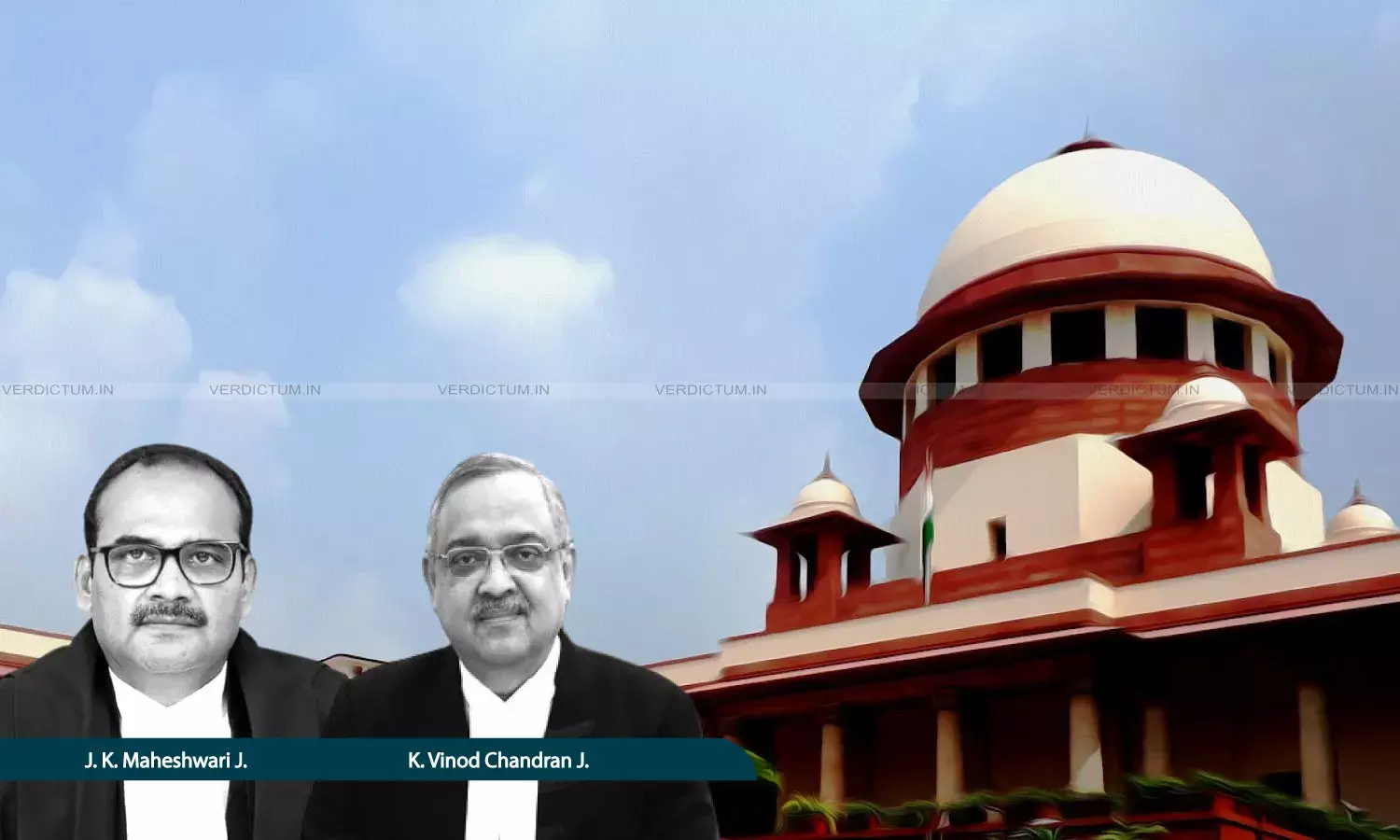In Eviction Suit, Proof Of Ownership Of Tenanted Premises Not To Be Strictly Looked At As In Suit For Declaration Of Title: Supreme Court
The appeal before the Supreme Court revolved around a landlord-tenant dispute.

Justice J.K. Maheshwari, Justice K. Vinod Chandran, Supreme Court
While ordering the eviction of tenants who disputed the title of the successor of the landlord, the Supreme Court reaffirmed that in a suit for eviction, the proof of ownership of the tenanted premises is not to be strictly looked at as in a suit for declaration of title.
The appeal before the Apex Court revolved around a dispute where the successors of the landlord claimed eviction and possession on bona fide need, and the successors of the tenant sought retention on the ground that the alleged successor to the landlord had no title over the shop.
The Division Bench of Justice J.K. Maheshwari and Justice K. Vinod Chandran held, “ In any event, when an order of probate was produced, which is not mandatory, the claim of the plaintiff through a Will attains a legal sanctity which could not have been brushed aside by the High Court. It is trite that in a suit for eviction, the proof of ownership of the tenanted premises is not to be strictly looked at as in a suit for declaration of title.”
Senior Advocate Puneet Jain represented the Appellant while Senior Advocate N.K. Mody represented the Respondent.
Factual Background
The shop room, which was the bone of contention, was rented out to the father of the defendants by one Ramji Das, the father-in-law of the plaintiff. The father of the defendants, Kishan Lal, was carrying on a grocery business, which, after his death, the defendants, his sons, continued. The husband of the plaintiff carried on a sweets and savouries shop in a part of the building adjacent to the shop room and their family resided on the first floor of the building. The father-in-law of the plaintiff died. He had executed a Will bequeathing the shop room to his daughter-in-law, the plaintiff.
The plaintiff filed the suit for recovery of rent defaulted, from January 2000, and eviction on the ground of bona fide need. The defendants disputed the very title of Ramji Das and assailed the Will as a fraudulent one. The Trial Court held that the plaintiff failed to prove the ownership of the disputed shop and the landlord-tenant relationship, disentitling the plaintiff from recovery of rent, and eviction on grounds of bona fide need. The first appellate court remanded certain issues, but on remand by the High Court, affirmed the findings of the trial court, which was affirmed by the High Court in a further second appeal.
Reasoning
On a perusal of the facts of the case, the Bench noted that the deceased Ramji Das had left behind other legal heirs also, his wife, three daughters and the wife and children of a deceased son. None of them had challenged the Will when the matter was pending before the trial court. It was noticed that one of the grounds taken by the trial court to suspect the Will was that, though it was mentioned in the Will that the daughters of the testator were married off with their shares and even the wife and children of the deceased son had no interest in the property, nothing was kept aside for the wife. As per the Bench, the finding of the trial court that it was not natural that a person would not keep in mind the interest of his own wife, was not a valid ground to suspect the intentions of the testator or the probity of the bequest made.
The Bench further mentioned that the grounds on which the Will was suspected by the trial court couldnot be upheld. “The dispute regarding the title of Ramji Das could not have been raised by the tenant who had come into the premises by virtue of a deed executed by Ramji Das to whom, for more than half a century, the tenants were also paying rent”, it added.
Coming to the aspect of bonafide need, the Bench noted that there was no dispute as to the business carried on of sweets and savouries, in the adjacent shop room. There was also no dispute on the sons of the plaintiff also having joined the business and the plaintiff’s intention to participate in the business, thus expanding it to the tenanted premises. The bona fide need was established.
The Bench found that in the concurring decisions of all three courts, material evidence had not been considered and the courts entered into findings in a perverse manner based on mere surmises and conjectures. Setting aside the orders below and decreeing the suit, directing the recovery of rent arrears from January 2000 till the handing over of the possession, the Bench ordered the eviction on the grounds of default in payment of rent, as also for the bona fide need.
Allowing the appeal, the Bench ordered, “Only considering the long period of tenancy, we enable the respondents herein to continue in possession for six months, subject to their filing an undertaking before the trial court to pay the arrears of rent within one month and give vacant possession within six months from today; which undertaking shall be filed within two weeks from the date of this judgement. If no undertaking is filed the plaintiff would be entitled to seek summary eviction of the tenants from the premises.”
Cause Title: Jyoti Sharma v. Vishnu Goyal (Neutral Citation: 2025 INSC 1099)
Appearance
Appellant: Senior Advocate Puneet Jain, AOR Christi Jain, Advocates Kartik Karara, Akriti Sharma, Harsh Jain, Mann Arora, Om Sudhir Vidyarthi, Aditya Jain, Yogit Kamat, Siddharth Jain, Manit Moorjani
Respondent: Senior Advocate N.K. Mody, Ishita M Puranik, Adv. Advocates Jigisha Agarwal, Aniya, Suresh Kumar Bhan, AOR Praveen Swarup

